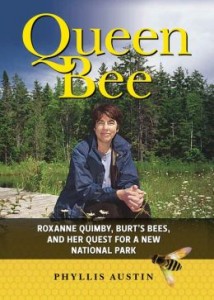A multi-millionaire named Roxanne Quimby spent years promoting a new national monument in Maine, which was finally established by President Obama over the objections of the State’s Governor and Senators. He also appointed Quimby to the National Park Foundation to honor her public-spirited donation of the land. She can certainly afford it, and I don’t begrudge the people of Maine another national monument (that’s their battle). It is her view on how the rest of us should treat property that raises eyebrows – and hackles.
“To me, ownership and private property were the beginning of the end in this country,” she told Yankee Magazine. “Once the Europeans came in, drawing lines and dividing things up, things started getting exploited and overconsumed.”So, the beginning of this country was, in fact, the beginning of the end? I doubt she really thinks things were better when some medieval king owned everything, or when warring tribes killed each other for territory, or even in modern-day dictatorships where private property is banned.
We can’t see into another person’s mind or heart, but we can see their actions. When Quimby was 25 and starting her adult life as part of the 1970s “back to the land” movement, the first thing she did was move to Maine, buy a piece of land, and build a cabin. Like generations of American dreamers, though, when she had a family, that rustic lifestyle became less appealing.
“I realized my informal vow of poverty was limiting my children’s choices,” she says. “To give my kids opportunities I had to start a business.” She founded Burt’s Bees, the personal care products company, built an empire, and sold it for $175 million. I admire her entrepreneurship immensely, so why shouldn’t such success be everyone’s dream?
Quimby used her massive fortune to buy more land, including 120,000 acres of forest, which she immediately closed to all hunters, loggers, and others. She donated 87,000 acres for the new national monument, but still owns plenty.
This isn’t really about Quimby; there are hypocrites everywhere. But is this burgeoning public land movement really about saving beautiful places, or does it represent a deeper view that beautiful places can only be preserved by government ownership? Or worse yet, that all land should be owned by the government, or that private property is evil?
Private property is the heart of America’s founding principles, identified even before the American Revolution as a cornerstone of “natural law.” That was defined in the 17th Century by John Locke, explaining that the ability to reason makes man unique. Adam Smith added that the ability to trade with others is the source of prosperity, dependent upon ownership of property from which to produce.
Locke wrote, “Reason, which is that Law, teaches all Mankind, who would but consult it, that being all equal and independent, no one ought to harm another in his Life, Health, Liberty, or Possessions.” He informed Jefferson’s later scholarship, writing “That all men by nature are equal” and that nature gives everyone the right “to preserve his property, that is, his life, liberty, and estate against the injuries and attempts of other men.” America’s founders believed Locke’s view that government “can never have a Power to take to themselves the whole or any part of the Subjects Property, without their own consent. For this would be in effect to leave them no Property at all.” Do modern public land advocates really want that?
The Virginia Declaration of Rights, which preceded our Declaration of Independence, included more detailed wording: “That all men are by nature equally free and independent and have certain inherent rights, of which, when they enter into a state of society, they cannot, by any compact, deprive or divest their posterity; namely, the enjoyment of life and liberty, with the means of acquiring and possessing property, and pursuing and obtaining happiness and safety.”
Jefferson changed the word “property” to “happiness,” not because the founders didn’t care about property, but because it was universally understood as the basis for all natural rights. History Professor Timothy Shannon writes, “With that context in mind, Jefferson’s ‘pursuit of Happiness’ becomes much more than a pleasing turn of phrase. It was a remarkably succinct expression of the American dream, a confident look to the future, rather than a backward nod to Locke. As such, it remains foundational to how we define ourselves as a nation.”
Quimby says “A park takes away the whole issue of ownership. It’s off the table; we all own it and we all share it. It’s so democratic.” But public land ownership didn’t provide for her children. Private property did that.
A version of this column originally appeared in the Grand Junction Daily Sentinel February 10, 2017.





Comments on this entry are closed.